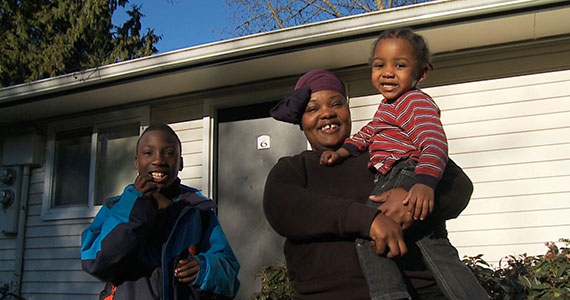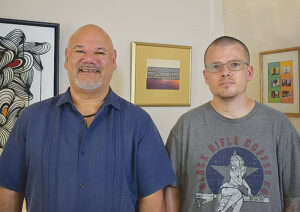Solid Ground works to keep people in their current homes through information, advocacy, case management and limited financial support. We strive to rapidly rehouse families who lose their housing and connect people with long-term housing solutions. We also work to undo the impact of institutional racism that’s baked into laws, policies and procedures and creates barriers for people of color struggling to access and maintain housing.
Housing First
Philosophy
Solid Ground housing and homelessness prevention programs and services operate under a Housing First philosophy. We believe that Housing First is the best way to rapidly solve homelessness, because it’s cost effective, proven to improve people’s lives, and builds a community of support around them. Our program participants’ experiences attest to the fact that people can best achieve stability and address the barriers they face when they have secure housing.
We believe that safe and stable housing is a basic human right – so we work to quickly and successfully connect individuals and families experiencing homelessness to permanent housing without preconditions and barriers to entry (including criminal records or sobriety, treatment, or service participation requirements).
As an anti-poverty organization, we aim to eliminate systemic barriers – especially those that target vulnerable populations such as people living with behavioral health conditions, domestic violence survivors, and communities of color. We believe the causes of homelessness are rooted in systemic injustices that are deeply ingrained in our society.
Our staff are trained in trauma-informed care and anti-racism as well as Housing First principles. Our services are grounded in the belief that housing is a foundation: By providing access to permanent housing without prerequisites, we can holistically support people facing systemic roadblocks and injustices.
BACK TO TOPPeople-centered Alignment
Housing First aligns with our people-centered approach. Each individual and family we serve brings a complex and unique story that deserves individualized attention and care. We believe that people know best what they need to succeed, so we support them to determine positive paths to reach their goals and vision for their future.
Consistent with our agency value of respect, our people-centered approach prioritizes their meaningful participation in our work together.
Solid Ground’s housing and homelessness programs are low barrier, designed for people experiencing homelessness or escaping domestic violence. This means there are no arbitrary requirements for program entry, and we walk alongside people as they progress at their own pace, respecting and upholding their self-determination.
We actively partner with participants to remove housing barriers and identify housing opportunities that are right for them. Once they’re housed, our focus shifts to housing stability, tailored support services, and thriving.
If participants have needs that Solid Ground programming can’t meet, we develop a plan with them to access needed resources through partnerships and referrals.
BACK TO TOPEvidence-based Approach
Housing First is evidence based. In the early 1990s, multiple studies in New York City compared Housing First to Treatment First models, where participants must comply with specific prerequisites – such as behavioral health treatment – before they’re given access to housing.
Studies comparing the two approaches look at how long people remain in housing, as well as improvement in their psychosocial status. Housing First repeatedly shows better outcomes than Treatment First and creates cost savings due to reductions in emergency room visits, hospitalizations, residential substance use programs, and prison time.
Specific populations shown to benefit from the Housing First approach include BIPOC, domestic violence survivors, people living with HIV, and those with behavioral health conditions. A primary driver of these improved outcomes is that the person-centered approach gives autonomy to participants, which results in them working harder on their goals.
Solid Ground believes that Housing First is the best way to rapidly solve homelessness, because it’s cost effective and proven to improve people’s lives while building a community of support around them.
BACK TO TOP
Preventing Housing Loss
Prevention is the most cost-effective way to reduce homelessness. To do this, we help people stay in their current homes when possible – rapidly rehouse them when it’s not – and provide in-depth case management and other support services to help them hold on to stable housing.
Tenant Services
Solid Ground is a HUD-certified Housing Counseling agency serving people across Washington state. Our Tenant Counselors help families and individuals maintain permanent and reliable rental housing through:
- Tenant Resources and tools to prevent eviction and ensure housing stability.
- Help understanding renters’ rights and responsibilities.
- Information on the Washington State Residential Landlord-Tenant Act and other laws impacting renters.
- Support with housing search, including where to look, how to apply, and credit screening.
- Guidance through the eviction process.
- Legal and community resource referrals.
Rent Smart & ¡Inquilinos Inteligentes! Webinars
Solid Ground’s Tenant Services offers educational webinars to help Washington state renters understand their rights and responsibilities under state landlord/tenant law. These include Rent Smart and ¡Inquilinos Inteligentes! webinars in English and Spanish, offered in collaboration with the King County Library System and Seattle Public Library. Click the button below to see the complete schedule and registration links.
Solid Ground’s Tenant Counselors are also available to offer educational webinars on Washington State landlord-tenant laws and other topics related to ensuring successful tenancies. Contact us at tenantwa@solid-ground.org if your group, organization or community would benefit from this training.
Tenant Advocacy
Want to make Landlord-Tenant laws work better for tenants? Your story can help! Solid Ground’s Tenant Services Advocates work with lawmakers to protect and expand the rights of renters. Help us change costly screening and application fees, wrongful evictions, discrimination and other housing barriers. Real-life stories make a significant impact on lawmakers. We can help you share your story in order to change the laws.
To learn more about how you can share your story, contact Tenant Services at 206.694.6748 or email tenantwa@solid-ground.org.
BACK TO TOPJourneyHome Rapid Rehousing
Research shows that the faster people experiencing homelessness get back into housing, the more successful they will be long-term. Our JourneyHome program provides rapid rehousing, case management, housing advocacy, and housing search assistance for families with children experiencing homelessness in King County.
- Supports families with children to get into housing as quickly as possible.
- Helps families set realistic goals to secure and maintain permanent housing.
- Builds strong relationships with landlords to gain access to housing.
- Emphasizes skills and resources people need to get and stay housed.
With the support of a case manager/housing advocate team and flexible funding, each family develops goal plans to help address barriers preventing them from getting and keeping permanent housing.
Regional Access Point (RAP) — Shelter Diversion
Shelter Diversion seeks to keep people experiencing homelessness from having to enter the shelter system in the first place. It looks for flexible, creative options to safely divert people to housing. Regional Access Points (RAPs) are King County entry points to Coordinated Entry (CE), which is intended to ensure that people experiencing homelessness have equitable access to housing resource connections to resolve their housing crises. RAPs are resource centers where households experiencing homelessness can start exploring their housing options. Solid Ground operates the North Seattle Regional Access Point (RAP) Diversion Program.
To qualify, you’ll need to have already:
- Found a place to live (can include moving in with a relative or friend and/or relocating to another area).
- Be approved for move-in.
To apply, through North Seattle RAP, leave a voicemail at 206.694.6833, M–F, 8:30am – 5pm. (We respond as quickly as staff capacity allows; closed on holidays.) To view all King County RAP locations, visit King County Regional Housing Authority’s Regional Access Points site.
Providing Housing
Solid Ground’s residential facilities provide emergency shelter, transitional and permanent housing, and comprehensive case management for families and individuals formerly experiencing homelessness. Beyond providing roofs over heads, we strive to connect residents with the resources and support they need to identify and achieve their goals.
Broadview: For Domestic Violence (DV) Survivors
Broadview Shelter and Transitional Housing is a safe haven at a secure location for parents and their kids experiencing domestic violence (DV) and homelessness. It’s the only DV shelter in Seattle where a person with children can call directly seeking services without a referral. Using a trauma-informed care model, we provide case management, children’s programs, DV and addictions support groups, parenting classes and housing search assistance.
Founded in 1983, Broadview was one of the first residential programs in our community for women and children moving out of DV situations. Today, we serve survivor-led households with parents of all gender identities experiencing homelessness through emergency shelter and transitional housing in a secure, confidential facility.
With a comprehensive array of support services and a trauma-informed care focus, Broadview helps residents acknowledge and heal from displacement and abuse, address the issues that led to their homelessness, and find secure, permanent housing.
Broadview’s specialized children’s services help young people restore a sense of safety, normalcy, and structure so they too can heal and thrive.
Domestic Violence Survivors may call 206.299.2500 for Solid Ground’s confidential Domestic Violence shelter services, or 2-1-1 for other King County resources.
BACK TO TOPFamily Shelter
Family Shelter provides short-term housing in furnished apartments for families and single-parent households (headed by mothers or fathers) with children 18 and younger, and can accommodate large or extended families.
Support services, comprehensive case management, and housing search assistance helps families stay connected to their schools, jobs, and other community resources and support systems. Our primary program goal is to help families find more permanent housing as quickly as possible.
Family Shelter cannot be accessed directly. Families needing emergency housing should contact 2.1.1 for screening eligibility for all King County programs.
BACK TO TOPSand Point Housing
Our Sand Point Housing campus provides permanent supportive housing, affordable permanent housing, and onsite support services for formerly homeless families and individuals. Located in Seattle’s Magnuson Park near Lake Washington, the campus is on property surplussed by the U.S. Navy. It includes historic renovated buildings and newer construction totaling 183 townhomes and apartments. Since 1999, several thousand people have stayed at Sand Point Housing in their journeys from homelessness to stability. Today, 400+ people – about half of whom are children and youth – live in a thriving community with onsite support services at Sand Point.
The Sand Point Housing campus includes…
- Brettler Family Place
- Sand Point Family Housing
- Phyllis Gutiérrez Kenney Place
- Santos Place
- Three group residences operated by Friends of Youth and YouthCare
Sand Point Housing can’t be accessed directly. Families and individuals who need housing should contact 2.1.1 for screening eligibility for all King County programs.
History of Sand Point Housing
Originally summer hunting and fishing grounds for the Duwamish Tribe, Sand Point was home to Naval Station Puget Sound from 1922 until 1995. When it was surplussed, the City of Seattle’s Reuse Plan for the base included 200 housing units for people experiencing homelessness.
As a founding member of the Sand Point Community Housing Association, Solid Ground helped convert six decommissioned naval buildings into 94 housing units for people experiencing homelessness. In 2007, the City asked Solid Ground to manage the site and develop additional housing.
In 2011 and 2014, we opened new townhomes and apartments on campus, with a community space at its center. In addition, our partners YouthCare and Friends of Youth run group homes in what used to be naval officers’ quarters.
BACK TO TOP
Housing Advocacy
Building a Better Housing System
Solid Ground has a long legacy of fighting housing displacement, helping people stay in their homes, and building and managing affordable housing with support services. The lived experiences of the people who come to Solid Ground programs inform and empower our housing advocacy. Solid Ground’s forebear, the Fremont Public Association, was a leader in establishing foundational coalition efforts to advocate for creative solutions and innovative services to address homelessness.
- Instrumental in creating the Washington State Housing Trust Fund, which has awarded almost $1 billion in funding and helped build or maintain nearly 40,000 units of affordable housing statewide.
- Launched efforts to secure the Seattle Housing Levy, which has funded over 12,000 affordable apartments for seniors, low- and moderate-wage workers, and formerly homeless individuals and families. Also provided down payment loans to more than 800 first-time homebuyers and rental assistance to more than 6,500 households.
- Opened region’s first emergency shelter for women and children moving out of domestic violence.
BACK TO TOP
Landlord Advocacy
A huge increase in competition for affordable rental units in Seattle/King County means that people with spotty credit history face almost insurmountable barriers to finding affordable housing. Our Housing Advocates bridge a connection between families seeking housing and local landlords and property managers throughout King County to overcome these barriers and expand access to permanent, affordable housing.
BACK TO TOP


